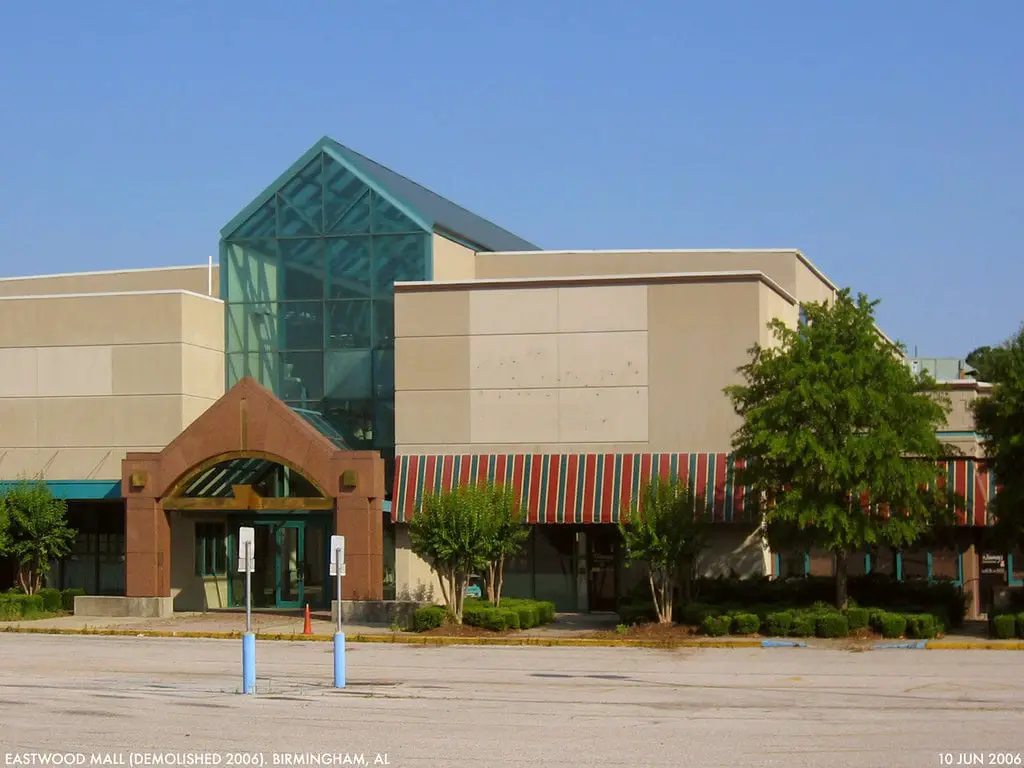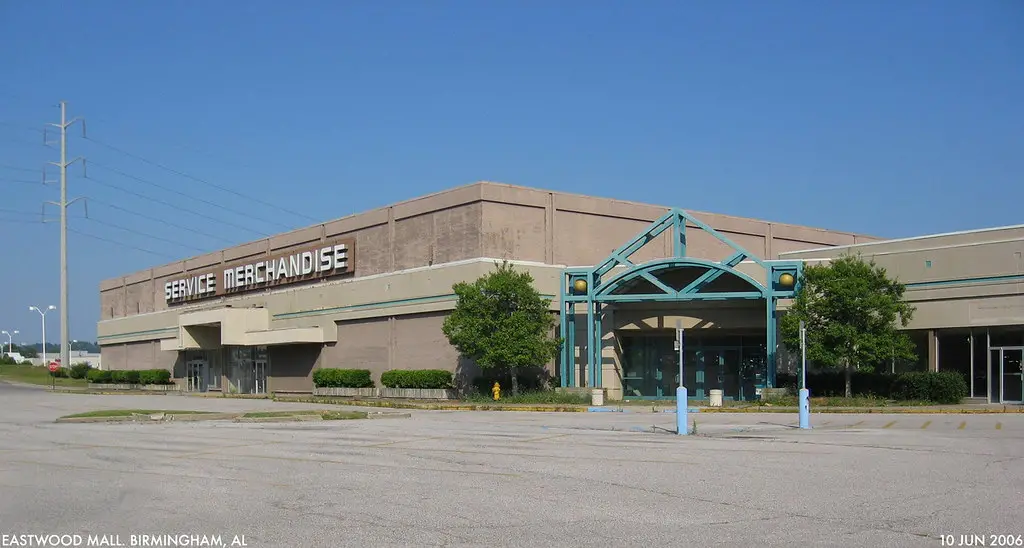The Birth of Eastwood Mall
Eastwood Mall opened on August 25, 1960, in Birmingham, Alabama. It was located between Montclair Road and Crestwood Boulevard, adjacent to I-20. When it opened, it was the second enclosed shopping mall in the Southeastern United States, following North Carolina's Charlottetown Mall, which had opened in October 1959.
The mall's initial anchor tenants included J.C. Penney, Colonial Stores, S.S. Kresge, J.J. Newberry, and Kroger. Colonial Stores and Kroger provided grocery options, while J.J. Newberry and S.S. Kresge offered five-and-dime merchandise.
On its opening day, Eastwood Mall featured 43 stores, providing a variety of shopping choices for Birmingham residents.
Eastwood Mall featured several attractions that drew shoppers, such as a 48-lane bowling center and a heliport. These amenities were designed to enhance the shopping experience.
On Christmas Day, 1964, the Eastwood Mall Theater opened, equipped for Cinerama movies. This single-screen auditorium showed popular films like "2001: A Space Odyssey" and "Ice Station Zebra."
In its early years, Eastwood Mall was a hub of commercial activity in Birmingham. Its strategic location and innovative features made it a popular destination for shoppers looking for things to do in Birmingham, Alabama. The mall remained a leading retail center in the area for nearly three decades.
Ownership and Expansion
In 1967, Alabama Farm Bureau, now known as ALFA, bought Eastwood Mall from Newman H. Waters. This change in ownership marked the beginning of new developments. ALFA owned the mall until the mid-1980s, overseeing various expansions and updates.
During the 1980s, Eastwood Mall saw further growth. The addition of a larger Parisian store expanded the mall's appeal. This expansion included more retail space and new stores, keeping the mall competitive in the growing market.
During this period, several new stores and chains joined the mall. Service Merchandise became one of the key anchors, adding to the variety of shopping options. These expansions aimed to maintain the mall's popularity amid rising competition.
Ownership changes and expansions helped Eastwood Mall evolve with the times. The updates and new stores reflected the changing retail landscape and kept the mall relevant to shoppers in Birmingham.
Competitive Challenges
Eastwood Mall faced new competition in 1975 when Century Plaza opened across the street. This new mall drew many shoppers away with its modern design and updated stores. Century Plaza featured major anchors like Sears and Loveman's, which attracted a lot of business.
To keep up, Eastwood Mall added new stores and renovated existing spaces. In 1989, the mall introduced a food court with a glass atrium and a large video screen. This renovation also brought in a Books-A-Million store and expanded the Parisian department store.
Despite these efforts, the new competition from Century Plaza and other malls in the area made it difficult for Eastwood Mall to maintain its previous success.
Increased competition and internal issues marked a challenging period for Eastwood Mall, which contributed to its decline in popularity during the late 1980s and early 1990s.
Decline and Closure
In the late 1980s and early 1990s, Eastwood Mall's decline became more apparent. Mismanagement during the 1989 renovations led to overcharged rents, causing many original tenants to leave. The mall struggled to attract new tenants, leading to vacant stores and a drop in foot traffic.
Larger, more modern malls opened in the Birmingham area, drawing shoppers away from Eastwood. The Eastwood Mall Theatre, once a major attraction, closed as new cinemas with multiple screens gained popularity. The decline in entertainment options further impacted the mall's appeal.
By the early 2000s, Eastwood Mall had become a shadow of its former self. Many stores had closed, and the mall's interior felt empty and outdated. In 2006, Walmart purchased the property and began demolition on June 23, 2006.
The demolition ended on August 30, 2006, marking the official end of Eastwood Mall. Walmart's purchase and subsequent redevelopment of the site into Eastwood Village reflected the changing retail landscape and the need to adapt to new shopping trends.

Demolition and Transformation
After the demolition, Walmart started construction on a new Supercenter, which opened its doors on October 22, 2007. The new Walmart replaced a smaller location in Irondale, bringing more shopping options to the area.
Eastwood Village emerged from the ashes of Eastwood Mall. The new shopping center featured several anchor stores, including Party City, Ross Dress for Less, Office Depot, and Shoe Carnival. This latest development aimed to revitalize the area and offer a modern shopping experience.
Inside the Walmart, a historical tribute to Eastwood Mall was set up. This display, created by Friends of Eastwood Mall, included a brief history and several photos. It served as a reminder of the mall's past and its impact on Birmingham's retail landscape.
Legacy and Current Status
Eastwood Mall left a lasting legacy in Birmingham's retail history. The transformation into Eastwood Village marked a new chapter for the location. Recent sales and investments in the area reflect ongoing interest and potential for growth.
In November 2014, MAP Eastwood LLC sold the western portion of Eastwood Village to Eastwood Village Shopping Center LLC for $17 million. This sale included a 134,000-square-foot area but did not include the Walmart or properties east of it.
The new owners saw Eastwood Village as a valuable investment. The shopping center remained over 90 percent occupied with tenants like T-Mobile, Starbucks, and Tuesday Morning, which showed the continued relevance of the location.
In 2024, Cove Capital Investments acquired the Eastwood Village retail center, showing that the area remains a prime investment spot. With stores like Five Below joining the lineup, Eastwood Village continues to attract shoppers and businesses alike.
The legacy of Eastwood Mall lives on through Eastwood Village, a testament to the area's enduring appeal and ability to adapt to changing retail trends.


I was there at the Eastwood Malls opening. I was just a kid from nearby, but I remember the event quite well. There was a real excitement there, including helicopter rides! It was a truly memorable event for Alabama!
I love hearing about your experience! The excitement of the opening day with helicopter rides sounds unforgettable.